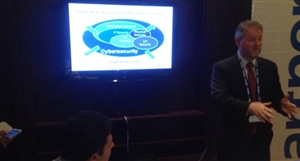An increase of 8 percent over 2013
Middle East and North Africa (MENA) spending on information security will reach US$1 billion in 2014, an increase of 8 percent over 2013, according to Gartner, Inc. Network security equipment and security services together will account for approximately 75 percent of enterprise spend in 2014, and this trend is expected to continue through 2018.
Eric Paulak, managing vice president research at Gartner, provided the latest outlook for the information security industry here today at the Gartner Security and Risk Management Summit, which is taking place through September 16.
“In response to the recent spate of security threats faced by organizations in the Middle East, a majority of the security projects currently underway and in the pipeline are focused on improving the security operations and incident response capabilities of enterprise infrastructure,” saidPaulak.
The market segments that benefit from this trend are network security, security implementation and security consulting. Globally, managed security services (MSSP) forms around 35 percent of all security services spending, but in the MENA region this is much lower at 16 percent. Analysts said this indicates that MSSP as a deployment model is not as mature or sought after in the region compared to more developed IT markets.
“The lack of availability of skills in the market, coupled with the prevailing business scenario, means that the majority of enterprises rely on value added resellers (VARs) and system integrators (SIs) for their security requirements, thereby creating a lot of opportunity for those vendors that can align themselves with emerging buying segments,” added Mr. Paulak.
According to Gartner, the increasing adoption of mobile, cloud, social and information (often interacting together) will drive the use of new security technology and services through 2016.By 2020, 60 percent of digital businesses will suffer major service failures due to the inability of IT security teams to manage digital risk. Digital business, powered by the Internet of Things (IoT), will disrupt the security organization more than emergence of the Internet.














